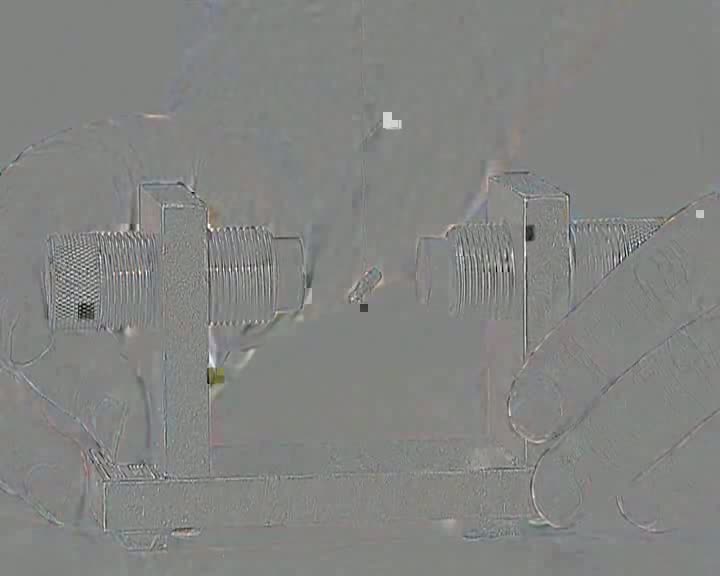„Diamágnesség, paramágnesség - szilárd anyagok” változatai közötti eltérés
| 6. sor: | 6. sor: | ||
Függőleges fonálon vízszintesen felerősített kis üvegrudat erős permanens mágnes vízszintes szimmetriatengelyű mágneses terébe helyezünk. Az üvegrúd a mágneses tér szimmetriatengelyére merőlegesen igyekszik beállni, bárhogyan is mozgatjuk vízszintes síkban a mágnest. Ugyanezt tapasztaljuk egy hengeres bizmutrúddal megismételve a kísérletet. Ezek az anyagok tehát diamágneses tulajdonságúak. A hasonlóan elhelyezett, a szimmetriatengellyel párhuzamosan felvágott hengeres alumínium cső viszont a mágneses tér szimmetriatengelyével párhuzamosan áll be. Az alumínium tehát paramágneses fém. Kérdés: Milyen célt szolgál az alumíniumcső hosszanti felvágása? | Függőleges fonálon vízszintesen felerősített kis üvegrudat erős permanens mágnes vízszintes szimmetriatengelyű mágneses terébe helyezünk. Az üvegrúd a mágneses tér szimmetriatengelyére merőlegesen igyekszik beállni, bárhogyan is mozgatjuk vízszintes síkban a mágnest. Ugyanezt tapasztaljuk egy hengeres bizmutrúddal megismételve a kísérletet. Ezek az anyagok tehát diamágneses tulajdonságúak. A hasonlóan elhelyezett, a szimmetriatengellyel párhuzamosan felvágott hengeres alumínium cső viszont a mágneses tér szimmetriatengelyével párhuzamosan áll be. Az alumínium tehát paramágneses fém. Kérdés: Milyen célt szolgál az alumíniumcső hosszanti felvágása? | ||
| − | = Diamagnetism, paramagnetism - solid matters | + | == Diamagnetism, paramagnetism - solid matters == |
| − | + | ||
| − | + | ||
Let us mount a small glass bar in horizontal direction on a vertical string in the magnetic field with horizontal symmetry axis of a strong permanent magnet. The glass bar will orient itself perpendicularly to the symmetry axis of the magnetic field irrespectively of the motion of the magnet. Repeating the experiment with a bismuth bar the same results are obtained. Consequently these materials are diamagnetic. A similarly arranged aluminum tube with a longitudinal cut along its symmetry axis will be oriented parallel to the symmetry axis of the magnetic field. Thus the aluminum is paramagnetic. Question: what is the purpose of the longitudinal cut on the aluminum tube? | Let us mount a small glass bar in horizontal direction on a vertical string in the magnetic field with horizontal symmetry axis of a strong permanent magnet. The glass bar will orient itself perpendicularly to the symmetry axis of the magnetic field irrespectively of the motion of the magnet. Repeating the experiment with a bismuth bar the same results are obtained. Consequently these materials are diamagnetic. A similarly arranged aluminum tube with a longitudinal cut along its symmetry axis will be oriented parallel to the symmetry axis of the magnetic field. Thus the aluminum is paramagnetic. Question: what is the purpose of the longitudinal cut on the aluminum tube? | ||
</wikitex> | </wikitex> | ||
A lap 2013. április 18., 15:31-kori változata
Az elhangzó szöveg
Függőleges fonálon vízszintesen felerősített kis üvegrudat erős permanens mágnes vízszintes szimmetriatengelyű mágneses terébe helyezünk. Az üvegrúd a mágneses tér szimmetriatengelyére merőlegesen igyekszik beállni, bárhogyan is mozgatjuk vízszintes síkban a mágnest. Ugyanezt tapasztaljuk egy hengeres bizmutrúddal megismételve a kísérletet. Ezek az anyagok tehát diamágneses tulajdonságúak. A hasonlóan elhelyezett, a szimmetriatengellyel párhuzamosan felvágott hengeres alumínium cső viszont a mágneses tér szimmetriatengelyével párhuzamosan áll be. Az alumínium tehát paramágneses fém. Kérdés: Milyen célt szolgál az alumíniumcső hosszanti felvágása?
Diamagnetism, paramagnetism - solid matters
Let us mount a small glass bar in horizontal direction on a vertical string in the magnetic field with horizontal symmetry axis of a strong permanent magnet. The glass bar will orient itself perpendicularly to the symmetry axis of the magnetic field irrespectively of the motion of the magnet. Repeating the experiment with a bismuth bar the same results are obtained. Consequently these materials are diamagnetic. A similarly arranged aluminum tube with a longitudinal cut along its symmetry axis will be oriented parallel to the symmetry axis of the magnetic field. Thus the aluminum is paramagnetic. Question: what is the purpose of the longitudinal cut on the aluminum tube?
